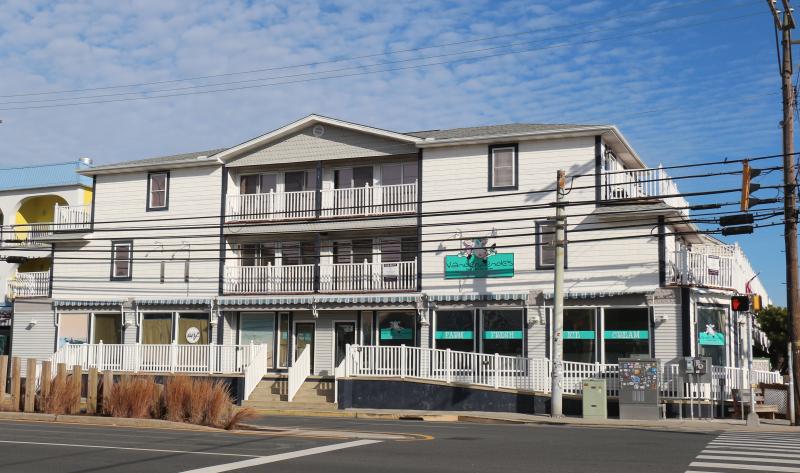Dewey board denies variance request

The Dewey Beach Board of Adjustment denied a property owner’s variance request regarding dwelling unit density after a public hearing in which the owner called concerns of a neighboring condo association president “bullarky.”
At the Dec. 7 public hearing, attorney Hal Dukes represented Jack Burbage of Mystic Harbour Corporation, who he said purchased the property at 23 Bellevue St. about a year ago.
The building houses tenants Vanderwende’s ice cream shop and Fells Point Surf Co. on the first floor and a six-bed condo on the second and third floors. The unit has been in existence for 30 years, Dukes said.
Burbage is also CEO of Blue Water, which purchased Pier Point Marina, now Dewey Beach Yacht Club, in 2021 and Bay Resort Hotel on Bellevue Street in 2019.
Dukes said his client sought a variance regarding maximum dwelling unit density to divide the six-bedroom residential unit into four- and two-bedroom units. Plans call for the addition of one kitchen.
Town Counsel Fred Townsend said the property is legal nonconforming, and the applicant requested relief from the density requirement for a parcel less than 3,600 square feet.
Building official Daune Hinks said that one dwelling unit in a multi-use structure is permitted per 3,600 square feet of land area. The building sits on 3,100 square feet, she said, so she had to deny the original application, as another 3,600 square feet of land area would be required.
Town and county requirements state that one kitchen is allowed per unit, Hinks said, so the dwelling needs to be divided into two units. Each unit would need a rental license if rented, she said.
When board Chair Julie Johnson asked about the owner’s hardship prompting the request, Townsend said the board needs to consider four factors when determining whether to grant the variance.
The board needs to consider the nature of the zone where the property lies, the character of the area, if removing the restriction will significantly impact neighboring properties, and if failing to remove the restriction creates an exceptional practical difficulty for the owner in making normal improvements to the property.
The board can grant relief to zoning code requirements, Townsend said, but the applicant needs to amend condo documents and pull a building permit, which are subject to construction requirements.
Burbage said he plans to make no changes to the first floor, and will make no structural, parking or occupancy changes to the residential units. Burbage said the plan is to put the four-bedroom unit on the second floor and the two-bedroom unit on the third.
Units of this size are needed by families more so than a six-bedroom unit, he said. Realtors estimate no real difference in income with two smaller rentals versus the larger one, Burbage said. Smaller units will rent more often to families, he said, and the need for six-bedroom rentals will go away.
The hardship is that it’s a substandard lot. Dukes said part of the land was taken when the highway was expanded. Dividing the condo into two units won’t change the neighborhood and will provide relief to the owner because it is easier to control smaller rentals, which are more family-friendly than large-group homes.
The building was constructed long after the highway was widened, Johnson said, so that is not a hardship. She also disputed Dukes’ assertion that group homes are a thing of the past in Dewey, noting that she knows several people who belong to such homes.
During public comment, Mario Giovannini, president of the Oceans Reach condo association, said that Oceans Reach shares a parking lot with 23 Bellevue St. On behalf of all seven units in the condominium, Giovannini said, they don't see a hardship, as the unit rents very well.
If the condo is split into two units, parking won’t change, but the number and frequency of cars moving in and out will increase in an already cramped parking lot, Giovannini said. The lot has a lot of activity as it is, he said, noting he has observed football games, grilling in fire lanes, general loitering and a lot of trash.
The number of renters in each unit will increase, he said. A condo with six bedrooms has a maximum occupancy of 14, while a two-bedroom condo and a four-bedroom condo have a combined maximum occupancy of 16, Giovannini said, noting there will be expanded living areas and that children under age 5 aren’t included in occupancy counts. One exit for two condos with two kitchens presents a fire hazard, he said.
The proposed change will likely result in more occupants under age 25, he said, which is worrisome.
“We all know what happens when Senior Week happens around here,” he said.
Given the opportunity to respond, Burbage said he had met Giovannini and had said they each need to be good neighbors.
“Well, I didn’t hear that tonight at all,” Burbage said. “I’m not changing anything. This having 16 people instead of 14 is bullarky.”
Burbage said he was not adding more rooms, and that an additional kitchen doesn’t allow for more people. The property has more parking than it needs, he said, noting he had gotten along well with condo association members.
“But it looks like he’s setting up something that he wants to fight,” he said. “I don’t think that’s right, because I believe that if you turn it down on a good reason, that’s fine, but some of the stuff he came up with is bull.”
At this point, Townsend told Burbage to direct his comments to the considerations of the board. Burbage said he apologized for getting his feathers ruffled, but stated there would not be any more cars than before and that the combined units would only hold 14 people, max.
Technically, Townsend said, the occupancy would potentially be increased by two if there is a living area in each unit. Each unit is allowed a certain occupancy number based on the number of bedrooms, with an additional two occupants attributable to a living area other than a bedroom.
Burbage said the unit has two living areas now, and Townsend stated that it is currently one unit; if split into two units, the living area in each separate unit would be afforded an additional two occupants.
In addition to Johnson, other board members found there was no exceptional practical difficulty or hardship. The owner has no difficulty renting the unit, the density would be twice that of code and adjacent residents stated they would be adversely affected by the change, members said.
A motion to deny the request passed unanimously.




















































